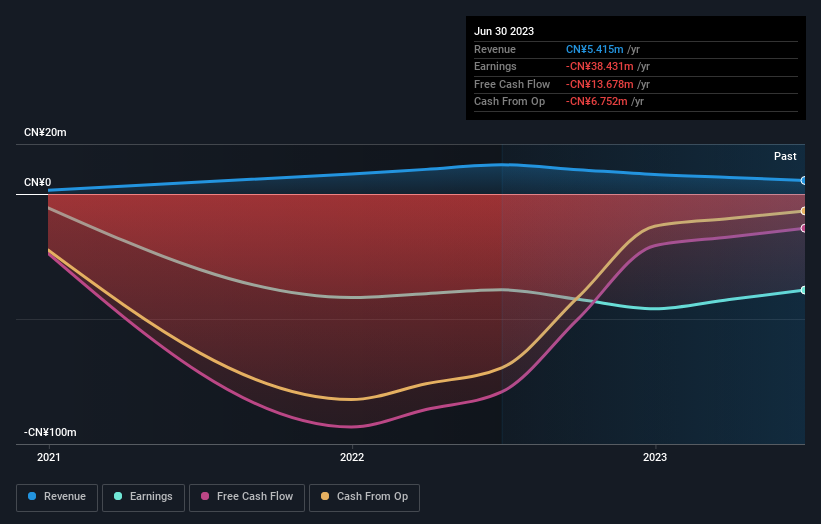Owning 74% in U Power Limited (NASDAQ:UCAR) means that insiders are heavily invested in the company's future
Key Insights
Insiders appear to have a vested interest in U Power's growth, as seen by their sizeable ownership
The largest shareholder of the company is Jia Li with a 72% stake
Past performance of a company along with ownership data serve to give a strong idea about prospects for a business
Every investor in U Power Limited (NASDAQ:UCAR) should be aware of the most powerful shareholder groups. With 74% stake, individual insiders possess the maximum shares in the company. Put another way, the group faces the maximum upside potential (or downside risk).
So, insiders of U Power have a lot at stake and every decision they make on the company’s future is important to them from a financial point of view.
Let's delve deeper into each type of owner of U Power, beginning with the chart below.
See our latest analysis for U Power
What Does The Lack Of Institutional Ownership Tell Us About U Power?
Small companies that are not very actively traded often lack institutional investors, but it's less common to see large companies without them.
There are multiple explanations for why institutions don't own a stock. The most common is that the company is too small relative to funds under management, so the institution does not bother to look closely at the company. On the other hand, it's always possible that professional investors are avoiding a company because they don't think it's the best place for their money. U Power's earnings and revenue track record (below) may not be compelling to institutional investors -- or they simply might not have looked at the business closely.
Hedge funds don't have many shares in U Power. The company's CEO Jia Li is the largest shareholder with 72% of shares outstanding. This essentially means that they have significant control over the outcome or future of the company, which is why insider ownership is usually looked upon favourably by prospective buyers. In comparison, the second and third largest shareholders hold about 11% and 2.3% of the stock. Interestingly, the third-largest shareholder, Bingyi Zhao is also a Member of the Board of Directors, again, indicating strong insider ownership amongst the company's top shareholders.
While it makes sense to study institutional ownership data for a company, it also makes sense to study analyst sentiments to know which way the wind is blowing. We're not picking up on any analyst coverage of the stock at the moment, so the company is unlikely to be widely held.
Insider Ownership Of U Power
While the precise definition of an insider can be subjective, almost everyone considers board members to be insiders. The company management answer to the board and the latter should represent the interests of shareholders. Notably, sometimes top-level managers are on the board themselves.
I generally consider insider ownership to be a good thing. However, on some occasions it makes it more difficult for other shareholders to hold the board accountable for decisions.
Our most recent data indicates that insiders own the majority of U Power Limited. This means they can collectively make decisions for the company. That means they own US$122m worth of shares in the US$164m company. That's quite meaningful. It is good to see this level of investment. You can check here to see if those insiders have been buying recently.
General Public Ownership
With a 15% ownership, the general public, mostly comprising of individual investors, have some degree of sway over U Power. While this group can't necessarily call the shots, it can certainly have a real influence on how the company is run.
Private Company Ownership
Our data indicates that Private Companies hold 11%, of the company's shares. It might be worth looking deeper into this. If related parties, such as insiders, have an interest in one of these private companies, that should be disclosed in the annual report. Private companies may also have a strategic interest in the company.
Next Steps:
It's always worth thinking about the different groups who own shares in a company. But to understand U Power better, we need to consider many other factors. For example, we've discovered 3 warning signs for U Power that you should be aware of before investing here.
If you would prefer check out another company -- one with potentially superior financials -- then do not miss this free list of interesting companies, backed by strong financial data.
NB: Figures in this article are calculated using data from the last twelve months, which refer to the 12-month period ending on the last date of the month the financial statement is dated. This may not be consistent with full year annual report figures.
Have feedback on this article? Concerned about the content? Get in touch with us directly. Alternatively, email editorial-team (at) simplywallst.com.
This article by Simply Wall St is general in nature. We provide commentary based on historical data and analyst forecasts only using an unbiased methodology and our articles are not intended to be financial advice. It does not constitute a recommendation to buy or sell any stock, and does not take account of your objectives, or your financial situation. We aim to bring you long-term focused analysis driven by fundamental data. Note that our analysis may not factor in the latest price-sensitive company announcements or qualitative material. Simply Wall St has no position in any stocks mentioned.


